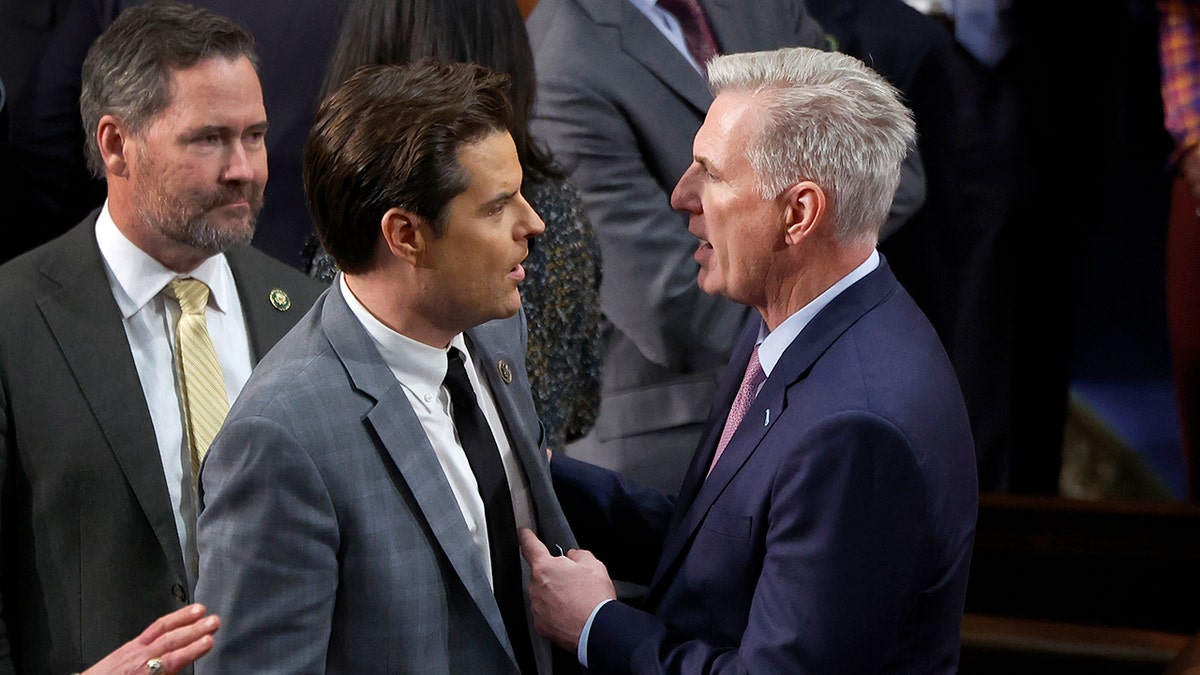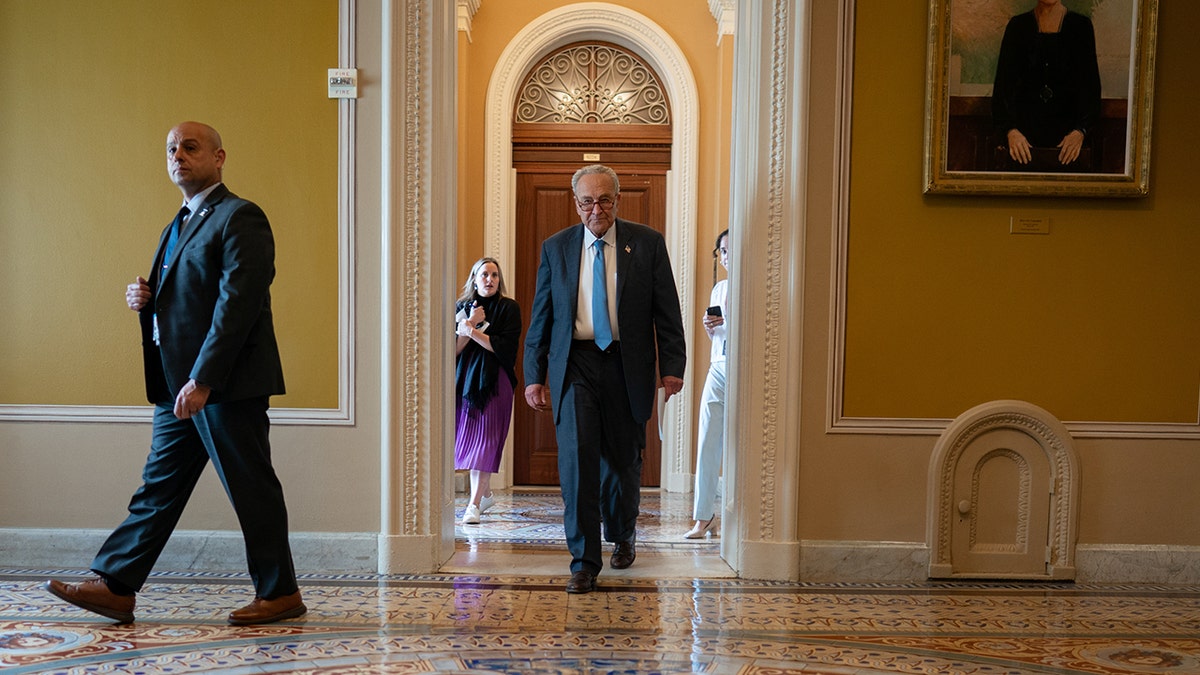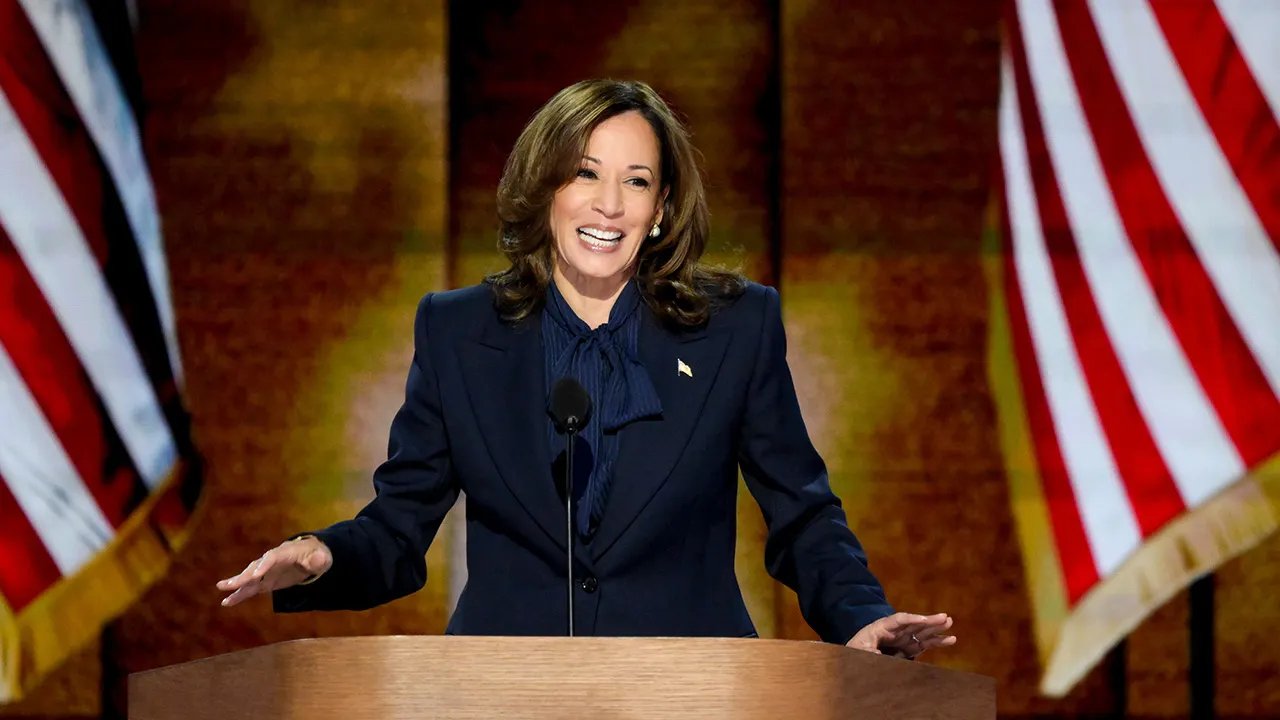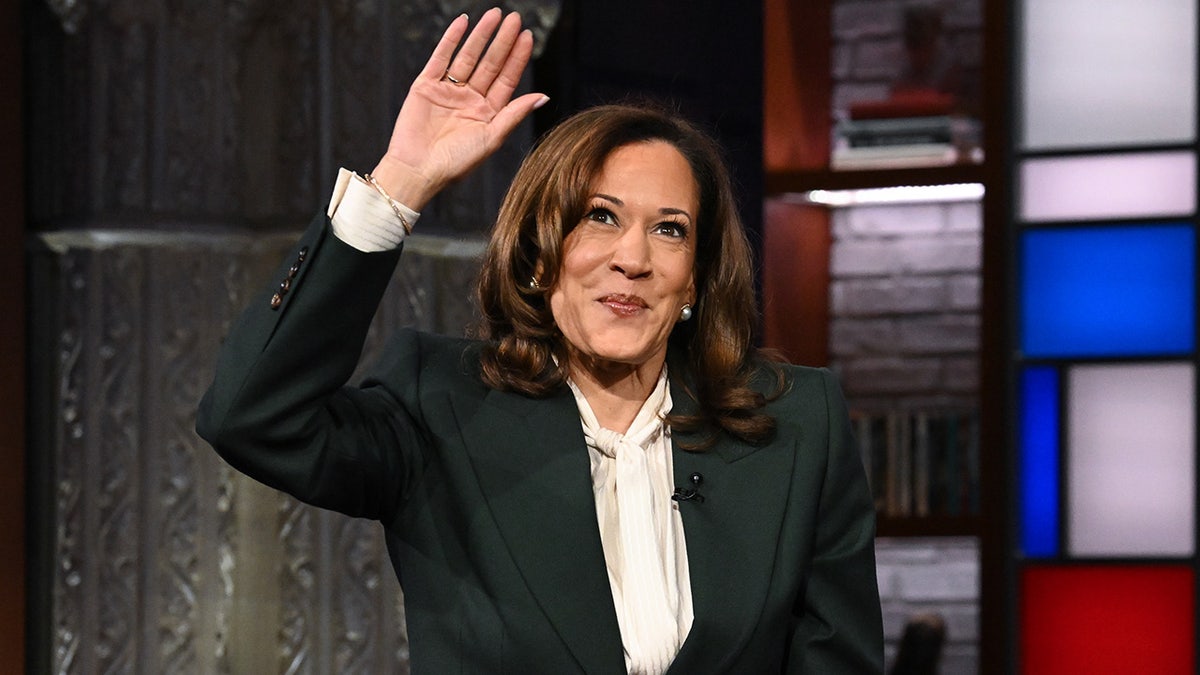INTERNACIONAL
Trick or Treat: Congress faces ‘chamber of horrors’ as government funding deadline looms

NEWYou can now listen to Fox News articles!
It was mid-July. And the House of Representatives was already done for the summer.
That’s right around the same time Halloween decorations like gigantic yard skeletons and Reese’s peanut butter and chocolate pumpkins began materializing in stores.
Those weren’t phantasms. Halloween is the next big consumer holiday on the calendar.
I mean, what would you buy to decorate for Labor Day?
But there’s a spooky alignment between July and Halloween when it comes to Congress. If you begin to see Halloween paraphernalia in July, that’s practically October in Capitol Hill terms. The reason? Congress didn’t finish its annual spending bills before the annual August recess and that means it will be a sprint to finish them by October 1, the deadline to avoid a government shutdown.
GRIDLOCK CRUMBLES AS SENATE ADVANCES SPENDING BILLS IN RACE AGAINST SHUTDOWN
Right around the same time that the rest of the nation starts thinking about ghosts and goblins for Halloween.
The funding deadline is enough to convert the U.S. Capitol into a chamber of horrors for the entire month of September. Congress is always dragging to complete spending measures in July. Then August comes and concerns about the spending bills vanish like a ghost. Then the appropriations bills rise like mummies out of their coffins when Congress comes back in September. The battle over averting a government shutdown is like a vampire. It sucks most other legislative activity out of Congress until there’s a deal. That’s because most Members want no part of a government shutdown. Lawmakers from both sides know that government funding is one of the most important inflection points on the political calendar.
Let’s examine where we stand with government funding.
Congress approved a stopgap spending bill to avert a government shutdown in March. That interim spending package funded the government through September 30, the end of the federal fiscal year. The House approved the bill. But lawmakers worried about a potential government shutdown because breaking a filibuster on the measure required 60 votes. That entailed support of some Democrats since Republicans only have 53 votes in the Senate.
U.S. Speaker of the House Mike Johnson (R-LA) delivers a statement on the Israeli museum shooting that left two Israeli Embassy staffers dead after holding a press conference on the House passage of the tax and spending bill, at the U.S. Capitol on May 22, 2025 in Washington, DC. (Kevin Dietsch/Getty Images)
At the last minute, Senate Minority Leader Chuck Schumer, D-N.Y., announced he would help Republicans crack the filibuster. Schumer didn’t vote yes on the bill itself. But the New York Democrat argued that avoiding a shutdown at that point was better than enduring one under President Trump – and Elon Musk who was then fully empowered at DOGE.
Some longtime Capitol Hill hands and Congressional observers feared the government might shutter for a lengthy period if it closed. Schumer and other Democrats asserted that the President and Musk would use that as justification for never re-opening some parts of the government since they lacked funding from Congress.
Progressives excoriated Schumer for not extracting a major concession from President Trump and Congressional Republicans which reflected Democratic values and priorities. Liberals used Schumer’s decision as justification to demand new Democratic leadership in the Senate. House Minority Leader Hakeem Jeffries, D-N.Y., appeared to seethe at Schumer’s maneuver, sidestepping questions from reporters about the break.
White House Budget Director Russ Vought says he wants a less bipartisan appropriations process. That’s fine. But this is about the math. House Republicans must stick together to pass any spending package there. House Speaker Mike Johnson, R-La., can only lose three votes and still pass a bill without Democratic assistance. Likewise, Senate Republicans can only lose three votes there, too. But the real hurdle is the filibuster. That’s where 60 votes are necessary. And that means the GOP must lean on Democrats – assuming they’re willing to help out.
HILLARY RIPPED AS ‘MASSIVE LIAR’ AFTER SCATHING REACTION TO TRUMP’S PLAN TO FIX DC CRIME
It’s really unclear if Republicans can stick together to approve a spending package. Keep in mind that it’s almost a certainty that any spending measure must simply renew all current funding on a temporary basis. A lot of Republicans are fed up with this appropriations rut – especially since Johnson promised to do things differently once he claimed the Speaker’s gavel in October 2023. Remember that some conservatives helped bounce former House Speaker Kevin McCarthy, R-Calif., less than two years ago because he propounded an interim spending plan.
Some Republicans are beginning to lose patience with Johnson on spending plans. But remember that most Republicans will support whatever appropriations plan the GOP brass concocts – as long as it has the blessing of President Trump.

U.S. House Republican Leader Kevin McCarthy (R-CA) (L) talks to Rep.-elect Matt Gaetz (R-FL) in the House Chamber after Gaetz voted present during the fourth day of voting for Speaker of the House at the U.S. Capitol Building on January 06, 2023 in Washington, DC. ( Chip Somodevilla/Getty Images)
So Vought may advocate for a more partisan process. But that won’t result in policy achievements and GOP spending priorities unless Republicans convince Democrats to play ball.
Here’s another dynamic: some members of the conservative Freedom Caucus are hinting they simply want to re-up the current levels of funding again. Yes, lawmakers approved those spending plans under President Biden and a Democratic Senate. Therefore, much of the federal government is still operating under Democratic spending blueprints. But Democrats would demand more money for the next spending round. The same with some Republicans. So voting to renew the old money – regardless of who pushed for it – is less than Congress could have spent. That’s why some Freedom Caucus members suggest this would serve as a de facto spending cut.
They’re not wrong. Federal spending is almost always on an upward trajectory. This would level things off and bend the annual spending curve for the first time in decades.
TRUMP FIRES BACK AT ‘SQUAD’ MEMBER WHO CALLED HIM A ‘PIECE OF S—‘ AT RALLY
So, if your goal is to trim funding, this may be the most plausible option under the present political circumstances.
Remember, it’s about the math.
Moreover, Republicans have only approved a pittance of the funding cuts demanded by DOGE. Congress passed a bill to slash $9 billion from the Corporation for Public Broadcasting and foreign aid. That’s not a lot. And Republicans could barely approve that bill. How they rescind other funding remains to be seen. However, Republicans could greenlight all the old money – and then promise budget hawks they will attempt to claw back other tranches of spending through future recissions packages later in the fall or winter.

Senate Minority Leader Chuck Schumer, a Democrat from New York, arrives to speak to members of the media at the US Capitol in Washington, DC, US, on Thursday, July 17, 2025. Republicans are set to succeed in their decades-long quest to end federal funding for public broadcasting after the Senate passed a $9 billion package of cuts derived from Elon Musk’s Department of Government Efficiency effort. Photographer: Al Drago/Bloomberg via Getty Images (Al Drago/Bloomberg via Getty Images)
But Democrats won’t go for that. They’d view that as Republicans dropping a Hershey’s bar in their trick or treat bag – and then exchanging it for a rock.
It’s unclear if Democrats have explored soaping the Republicans’ windows at the Capitol this fall if Republicans attempt that gambit. But this could be a chance to find out.
That brings us to the conundrum facing Schumer. One might question how the politics have changed since March – although President Trump and Musk are no longer in league with one another. But progressives will expect Schumer to demand a king’s ransom in exchange for Democratic votes breaking a filibuster.
In other words, both Johnson and Schumer face decisions of frightening proportions very soon.
It may seem as though October 1 is a long way down the calendar. It’s not. To ignore how complicated this may become is the legislative equivalent of whistling past the graveyard.
CLICK HERE TO GET THE FOX NEWS APP
This is going to become a rather spooky fall when it comes to funding the government.
Makes you want to just sit in the corner, pull a blanket up over your head and devour a bag of Halloween candy.
republicans,budget,democrats,politics,congress,mike johnson,donald trump
INTERNACIONAL
Trump admin renews effort to exclude Harvard from billions in federal research grants

NEWYou can now listen to Fox News articles!
The Trump administration on Monday said it has started a new process to block Harvard University’s eligibility for federal grant money and its ability to enter into new federal contracts — yet another salvo from Trump officials as they continue to target the nation’s oldest and wealthiest university.
The Department of Health and Human Services notified Harvard President Alan Garber in a letter Monday that it has initiated the debarment process for the university — a move that would render the school ineligible to receive federal grant money or enter into new federal contracts.
HHS officials cited allegations of antisemitism brought against the university and what Trump officials argued is the school’s failure to comply with recommendations from a federal antisemitism task force earlier this year.
FEDERAL JUDGE BLOCKS TRUMP ATTEMPT TO FREEZE MORE THAN $2 BILLION IN HARVARD FUNDS
Harvard President Alan Garber addresses the crowd during the university’s 373rd commencement ceremony. (Craig F. Walker/The Boston Globe via Getty Images)
The familiar refrain has been at the center of a months-long legal fight between Trump officials and Harvard lawyers, who sparred over efforts to comply with recommendations from a federal task force earlier this year.
Trump officials have argued the school has not done enough to comply with the task force recommendations; Harvard has countered that the effort amounts to an unconstitutional «pressure campaign» from the administration to influence and exert control over its academic programs.
It’s unclear how long the debarment process will take, and these efforts are often preceded by a shorter-term period of suspension, according to data from HHS’s Office for Civil Rights.
Still, if successful, the effort could threaten billions of dollars in funding for Harvard at an already vulnerable time for the university.
The debarment process, if successful, could eventually «blacklist» Harvard from doing business with the government in any capacity — including blocking its ability to accept billions in federal research funds and to sign new contracts with federal agencies.
CONTINUED COURT FIGHTS COULD PUT HARVARD IN UNWINNABLE POSITION VS TRUMP

Graduates celebrate during Harvard University’s 374th commencement ceremony on May 29, 2025. (Craig F. Walker/The Boston Globe via Getty Images)
Harvard’s lawyers have reportedly struggled to negotiate with the Trump administration in ongoing settlement talks, weeks after a judge in Boston sided with Harvard and ordered the administration to restore billions in funding to the school.
The news comes just weeks after a federal judge in Boston sided with Harvard in ruling that the Trump administration had acted illegally in freezing more than $2.2 billion in federal research funding that had been allocated to Harvard.
In an 84-page summary judgment earlier this month, U.S. District Judge Allison D. Burroughs rejected the Trump administration’s assertion that it was attempting to strip Harvard of billions in federal funding due to allegations of antisemitism, or the university’s failure to comply with the recommendations of a federal antisemitism task force.
«A review of the administrative record makes it difficult to conclude anything other than that defendants used antisemitism as a smokescreen for a targeted, ideologically-motivated assault on this country’s premier universities,» Burroughs said in her decision.
HARVARD PRESIDENT SAYS HE HAS ‘NO CHOICE’ BUT TO FIGHT TRUMP ADMINISTRATION

Hundreds of graduates walk out of Harvard’s 2024 commencement in Harvard Yard to call attention to the plight of Palestinians on May 23, 2024, in Cambridge, Mass. (Craig F. Walker/The Boston Globe via Getty Images)
Harvard lawyers sued the Trump administration in April over its attempts to freeze billions in federal funding and block other grant money — which they argued in court amounts to an unconstitutional «pressure campaign» designed to influence and exert control over its academic programs.
CLICK HERE TO GET THE FOX NEWS APP
The New York Times reported that the Trump administration is likely to appeal the ruling, though the time frame for the appeal and the next steps for challenging the summary judgment remain unclear.
politics,donald trump,white house,national security,education,federal courts
INTERNACIONAL
Chile impulsa un proyecto de cable submarino con China que pone en alerta a la región

Chile avanza silenciosamente en un proyecto de infraestructura digital que podría tener implicaciones profundas para la soberanía de datos en América Latina. Se trata del llamado “Chile–China Express”, un cable submarino propuesto que conectaría las costas chilenas con Hong Kong. Aunque a simple vista podría parecer un emprendimiento técnico más en la expansión global de las telecomunicaciones, lo cierto es que este plan se diferencia por la opacidad con la que se lo ha manejado y por los riesgos que se desprenden de la legislación china en materia de seguridad cibernética e inteligencia. La discusión trasciende los límites de Chile, pues cualquier país que interconecte sus redes con ese tendido quedaría expuesto a las obligaciones que empresas chinas mantienen con el Estado de Pekín.
La pregunta de fondo es por qué Chile necesitaría otro cable transpacífico cuando ya se encuentra en marcha el Humboldt, un proyecto desarrollado por Google junto con la empresa estatal Desarrollo País y la Oficina de Correos y Telecomunicaciones de la Polinesia Francesa. El Humboldt, cuya traza conecta Valparaíso con Sídney pasando por Tahití, fue anunciado públicamente, con cronograma, inversión y socios claramente identificados.
En contraste, el Chile–China Express aparece en registros de la industria como una iniciativa “en progreso” a cargo de Inchcape/ISS, con escasa información disponible sobre su financiamiento, consorcio y términos contractuales. La ausencia de convocatoria abierta y el bajo nivel de transparencia constituyen la primera señal de alarma.
El problema central es que no se trata de un cable cualquiera, sino de un proyecto que coloca a China en posición de controlar nodos de transmisión estratégica. Desde 2017, China cuenta con un marco legal que obliga a empresas y ciudadanos a cooperar con los servicios de inteligencia. La Ley de Ciberseguridad (CSL) establece requisitos de almacenamiento local, auditoría y transferencia de datos para operadores de infraestructura crítica.

A su vez, la Ley de Inteligencia Nacional exige la colaboración activa de cualquier empresa, dentro y fuera del país, con las actividades de inteligencia del Estado. En la práctica, esto significa que datos que circulen por infraestructura gestionada por empresas chinas pueden ser puestos a disposición de Pekín sin que los usuarios ni los Estados interconectados tengan forma de impedirlo.
En el caso de Chile, la vulnerabilidad no se limita a su territorio. Argentina, Brasil, Uruguay, Paraguay, Perú o Ecuador podrían ver parte de su tráfico enrutado por el Chile–China Express. La naturaleza transnacional de los cables convierte a este proyecto en un asunto regional y no solo doméstico. Así como las decisiones de endeudamiento de Ecuador en la década pasada tuvieron consecuencias en toda la cuenca del Pacífico, pues influyeron en los flujos de petróleo hacia Asia–Pacífico, el control chino de la infraestructura digital en Chile podría comprometer la seguridad de datos de millones de latinoamericanos.
La opacidad no es nueva en los acuerdos con China. Un estudio de AidData analizó más de un centenar de contratos de deuda con países de América Latina y África y concluyó que incluyen cláusulas de confidencialidad extraordinarias, restricciones de divulgación y garantías de pago por fuera de los mecanismos multilaterales como el Club de París. Infobae documentó cómo, en Ecuador, los préstamos chinos estaban respaldados en la entrega de crudo y contenían condiciones poco usuales que limitaban la transparencia. El patrón es claro: la política exterior china recurre al secretismo como herramienta para blindar sus intereses.

A la dimensión jurídica se suma la dimensión de inteligencia. Informes de Safeguard Defenders han documentado la existencia de más de 50 “estaciones de policía” chinas en el extranjero, incluidas algunas en América Latina. Estas oficinas, presentadas como centros de servicios para ciudadanos chinos en el exterior, han sido denunciadas por operar como mecanismos de vigilancia y coerción sobre la diáspora, en ocasiones presionando a personas a regresar a China bajo amenazas. Varios gobiernos de Europa y América han abierto investigaciones. El cable submarino, en ese contexto, no puede analizarse de manera aislada: forma parte de un ecosistema de herramientas de control extraterritorial que combina infraestructura digital, presencia física y presión diplomática.
El discurso de las autoridades chinas suele presentarse en clave de beneficio económico inmediato. Inversiones en plantas industriales, promesas de generación de empleo y transferencia de tecnología acompañan a estos proyectos. Pero la experiencia chilena muestra que muchas de esas promesas se han quedado en el papel. En 2021, se anunciaron inversiones de la farmacéutica Sinovac en Antofagasta y Santiago, así como proyectos de BYD y Tsingshan para instalar plantas de baterías de litio. Años después, ninguno de esos planes se ha concretado plenamente; algunos han sido suspendidos, otros retirados. Reuters y El País han confirmado que al menos dos de esas iniciativas fueron canceladas o congeladas.
En contraste, los proyectos gestionados con empresas occidentales han mostrado mayor transparencia en su ejecución. El Humboldt de Google, con cronograma claro y participación de entidades estatales chilenas, ilustra una forma distinta de negociar, más cercana a los estándares internacionales de gobernanza. Esto no significa que los cables controlados por actores occidentales estén exentos de riesgos, pero sí que sus condiciones contractuales han sido más accesibles para el escrutinio público.
El debate sobre el Chile–China Express toca además un punto crucial: la gobernanza digital. Al igual que en las decisiones de endeudamiento externo, las democracias deben decidir si aceptan acuerdos que limitan su capacidad de control sobre sectores estratégicos. La transparencia es el primer requisito para tomar decisiones informadas, y su ausencia es el síntoma más evidente de que lo que está en juego no es solo conectividad, sino soberanía.
La Ley de Ciberseguridad de China (CSL) obliga a los operadores de infraestructura crítica a almacenar localmente los datos y a cooperar con las autoridades chinas en caso de solicitudes de seguridad nacional. Esto incluye el derecho del Estado a realizar auditorías y requerir la entrega de información.
En cambio, La Ley de Inteligencia Nacional es una norma que complementa la CSL al exigir que cualquier organización o ciudadano “apoye, asista y coopere” con la labor de inteligencia del Estado. La ley no distingue entre actividades domésticas y en el extranjero, lo que amplía el alcance de la obligación.

El Humboldt conecta Chile con Oceanía con socios identificados. El Chile–China Express aparece como proyecto en progreso con destino Hong Kong. La duplicidad de rutas hacia Asia, una con Estados Unidos y otra con China como actores principales, refleja la competencia geopolítica por controlar la infraestructura digital en la región.
El trasfondo es geoestratégico: para Pekín, la infraestructura digital es la nueva columna vertebral de su influencia global. El Decimocuarto Plan Quinquenal de Informatización Nacional lo establece de forma explícita: China aspira a dominar las telecomunicaciones mundiales, no solo como proveedor de equipos, sino como operador de los canales de transmisión . El cable Chile–China Express, más allá de su utilidad comercial, se inscribe en ese objetivo.
INTERNACIONAL
‘Kamala is brat’: Harris reveals how scripted her failed 2024 campaign was with star-studded events

NEWYou can now listen to Fox News articles!
It took 27 drafts and coaching from «Barbie» director Greta Gerwig to perfect former Vice President Kamala Harris’ National Democratic Convention speech, Harris revealed in her book «107 Days.»
Harris’ book has pulled back the curtain on her short-lived presidential campaign, unveiling the celebrity cast of characters who boosted her campaign in public and behind the scenes.
«At 5:29 p.m., staff alerted me that the British singer-songwriter Charli XCX had posted: Kamala is brat. Brat was the title of her latest album and identified me with her brand: edgy, imperfect, confident, embracing. From then on, our rebranded Kamala HQ social media site was awash in her signature color, lime green, and posts supporting us used that color,» Harris wrote in her book, detailing the night former President Joe Biden suspended his reelection campaign.
As well as Charli XCX’s signature chartreuse filling Harris’ timeline, her presidential campaign quickly gained traction online as videos of Harris set to songs like Chappell Roan’s «Femininomenon» circulated on TikTok. But social media wasn’t the only medium Harris was honing in on, revealing in her new book that an Oscar-nominated director coached her through DNC speech prep.
KAMALA HARRIS MENTIONS MICHELLE OBAMA ONLY THREE TIMES IN 300-PAGE BOOK. HERE’S WHAT SHE SAID
Former Vice President Kamala Harris released her book «107 Days» about her short-lived presidential campaign on Tuesday, Sept. 23, 2025. (David Paul Morris/Bloomberg via Getty Images)
«I did twenty-seven drafts of my convention speech. I knew what was riding on it,» Harris said in her book.
Harris admitted that Gerwig, the «Little Women» and «Barbie» director, helped her rehearse. «When you speak about your family, see their faces,» Harris recalled that Gerwig had advised.
OBAMA, PELOSI, OTHER TOP DEMS RESISTED INSTANT HARRIS ENDORSEMENT CITING NEED TO ‘EARN IT,’ ‘HIKING’ EXCUSE
The former vice president also admitted to working with a professional voice coach.
«She was very serious about her job, but she wanted me to stand there and emit animal noises,» Harris said, explaining that she enlisted her team to join her in making «weird hums, grunts, and trills» to prepare for the DNC speech.

Musical artist Beyonce, right, and former Vice President Kamala Harris, left, embrace on stage during a campaign rally on Friday, Oct. 25, 2024, in Houston. (AP Photo/Annie Mulligan)
In the book, Harris said delegates at the convention wore T-shirts paying homage to her career or dissing President Donald Trump, and she said merchandise referencing Charli XCX’s «Kamala is brat» message was everywhere.
Weeks later with just a few days until Election Day, when Harris appeared on a podcast episode of «The Checkup with Doctor Mike,» Harris lamented that she was «ambushed by an unscheduled in-depth interview, with no notice, at the end of a nineteen-hour day.»
Harris said her team «knew I insisted on being well prepped, to inquire into the style of the show, the nature of the interviews the host did, the areas of likely questioning.» She said her team failed to give her a «briefing sheet so I could knock it out of the park.»
«What the f— was that?» the Democratic nominee said she asked her staff after the interview, while Grammy-winning artist Cardi B was delivering an introductory speech for Harris at a rally in Wisconsin.

Former Vice President Kamala Harris is seen as a guest on The Late Show with Stephen Colbert on July 31, 2025. (Scott Kowalchyk/CBS via Getty Images)
During Harris’ first rally in Atlanta after Biden dropped out of the race, she said Megan The Stallion was selected as the opener and Quavo as the introductory speaker as a way to «liven up» her solo campaign, «broaden the cultural appeal, and bring more creativity and fun.»
«There was a question about whether I should have any celebrities at my rallies,» Harris recalled in the book. «Did it seem too California, too Hollywood?»
CLICK HERE TO GET THE FOX NEWS APP
Harris recognized Taylor Swift’s «thoughtful endorsement» on Instagram the night of her debate against Trump, when the «Eras Tour» star called herself a «Childless Cat Lady» in a nod to comments by Vice President JD Vance.
Throughout Harris’ 107-day campaign, she was endorsed by countless celebrities, many who campaigned for her against Trump, including Beyoncé, Oprah Winfrey, Eminem, Bruce Springsteen, Lizzo, Jennifer Lopez, Julia Roberts, Stephen Curry and Billie Eilish, to name a few.
kamala harris,joe biden,elections,democratic party,biden pushed out

 POLITICA3 días ago
POLITICA3 días agoFrancos apuntó al gobierno de Kicillof por el triple femicidio narco: “¿Qué dirá la gente que votó a Magario?»

 POLITICA2 días ago
POLITICA2 días agoEmilia Orozco: “Si vuelve el kirchnerismo, todo el esfuerzo que hicieron los argentinos se va a tirar a la basura”

 POLITICA3 días ago
POLITICA3 días agoCiudad vs. provincia. Los recelos y los negocios que reveló el triple crimen de Florencio Varela

























